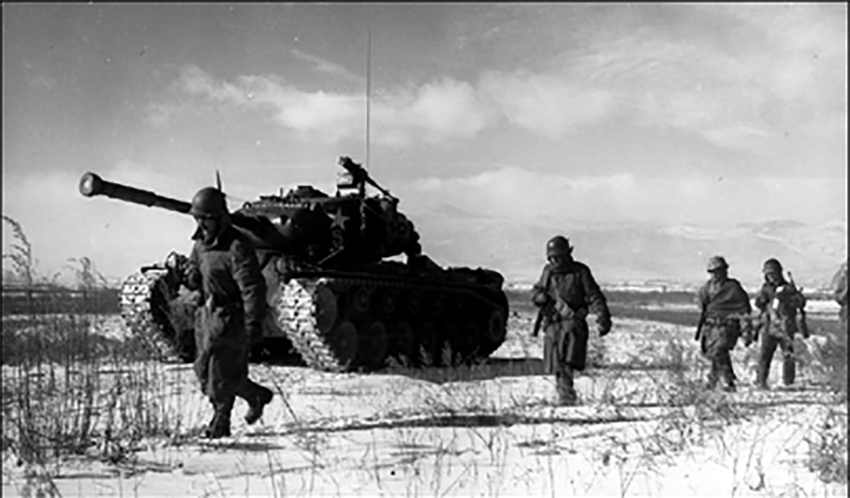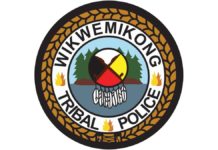A veteran’s story recalls Canada’s involvement in that still unresolved conflict
EDITOR’S NOTE: The following is the story, in his own words, of Sergeant Harvey Saumier who served with the Third Battalion of the Royal Canadian Regiment in the Korean War at age 21. Mr. Saumier resides in Mindemoya.
by Harvey Saumier
When the North Koreans invaded the South Koreans the United Nations got involved. Canada was one of many countries that sent troops to assist the South Korean government against this aggression.
There have been many stories from veterans describing their involvement in this conflict. Why did young men like me join the military as a volunteer during that era? Excluding veterans from the Second World War, were we aware that we would be trained for combat duty and sent to Korea?
This is my story.
For the first nine years of my life I was born and raised in a remote area of the wilderness in Quebec which was on the border of an Indian reservation, the only source of transportation was the train that occasionally passed by our log cabin, it continued onto the reservation, then to Temiskaming where a large pulp and paper mill operated.
My father worked in the lumber camps; my mother did her best to give me an education of sorts. When I reached the age of nine my father decided to move to Temiskaming and he was hired as a security guard at the mill.
This was my first experience attending school or for that matter seeing one, the other students referred to me as an “Indian.” So be it. My father was French; my mother was of Native descent.
I did fairly well in school, by the age of seventeen I started my first year in Grade 9. However, it got boring and I eventually dropped out.
My logic.
I could get a job at the paper mill, in one year I would have the down payment for a car, I would be able to buy some booze. Who needs this education crap? All the girls looking for a good time, I would provide this. It’s party time.
The reality of the situation.
I got the job, no car, but had access to buying booze. However, the older guys working at the mill would have nothing to do with me; I was too young to party with.
The high school types would not associate with me; I was not one of them anymore.
Now I was really bored.
A word of advice to students, before you decide to drop out of school reflect on what I have said, the grass is not greener out there, you will be greatly disappointed.
One day I visited North Bay. Walking down Main Street a sign in the window caught my attention.
‘Join the Canadian military, travel and see the world.’
Being curious I entered the recruitment office. One hour later I had taken the first step to joining the Canadian military, the recruitment corporal told me that I would probably make a good soldier. However, my intelligence test indicated that I would never hold any rank. Who cares, I wanted to travel and see the world.
When I told my parents, my mother cried, my father gave me some advice. ‘You may not like the way you are treated or told what to do, just keep your mouth shut, there is a reason for it.’
Two days later I and other recruits were transported by train to Toronto, then we were driven by truck to a military barrack, after a night’s sleep and some breakfast we were then assembled in a large room. Sitting next to me was this aboriginal man, some of the guys told me he was a Second World War veteran, and I asked him, ‘Is this boot camp a rough ride?’ He looked at me. ‘How old are you kid?’ ‘Nineteen I replied.’ He grinned, ‘If you think boot camp will be rough wait until you get involved in the Korean War, the North Koreans will want to kill you.’
I was stunned. Korea? Where in hell is that? What war? I thought I was joining the military to travel and see the world, the recruitment corporal never told me about this.
All types of individuals joined to serve in Korea, many were Second World War veterans, Tommy Prince was one them, he was the most decorated aboriginal in the Second World War, and the officers saluted him. An elderly priest had joined as a padre, he had spent many years with the Eskimos, a chap by the name of Raymond Labrosse. He and his wife were espionage agents in Nazi occupied France, the stories he told me. Many wanted to just get away from their present environment. One chap had a false eye, another had lost some toes, and I had a heart murmur. Obviously the medical was not thorough; we all ended up in Korea.
The commander of the infantry brigade was General John Rockingham, a Second World War veteran; he quit his job at the urging of the defence minister to lead the brigade, everyone referred to him as Rocky.
This officer entered the room and stated: ‘This is your last chance to leave this room; after you swear allegiance to the Queen you will be in the Canadian military.’
‘How many of you have a criminal record, be it minor or otherwise?’ he continued. ‘Be honest, we can find out. Raise your hands.’ Out of 60 recruits, about 25 lifted their hands.
The officer shook his head and swore.
We all took the oath and the next day we left for camp Petawawa for basic training, come morning we had a rude awakening as this sergeant with a walrus mustache walked down the rows of bunks screaming at us to get our asses out of bed and clean up around our area for inspection.
Some humour.
This was one chap who had a problem with getting out of bed in the morning, he always slept in and the rest of the guys paid the price with extra duties. Come morning we gently picked up his bunk and carried it to the centre of the parade square, I don’t have to tell you what transpired when walrus face came unto the parade square. He was never late again, alarm clocks were everywhere.
After basic training we left for Camp Borden for advanced training, I was promoted to corporal, and after extensive training we left by train for camp Wainwright, Alberta.
More training, then to the Lake Louise area, the hills were similar to the Korean landscape.
More humour.
One chap asked the officer why we had to dig trenches. The officer replied the deeper and narrower the better, it will keep the grizzly bears from reaching you at night. He did not have to repeat that again, digging was quickly completed without any more questions.
When this training was completed I was promoted to sergeant. We returned to the Wainwright area. This was our last camp before we were transported to Seattle; there were many tearful farewells from relatives. When we reached Seattle we boarded ship; we would be 16 days at sea before reaching Yokohama, Japan, and I reflect on the sea sickness during rough weather, the ship’s railing was crowded with sick soldiers.
More humour.
The galley was in the hole of the ship, you ate your meal from long tables, when the sea was rough the guy at the end of the table ended up with about 20 plates.
After Japan we left by ship to cross the Korean strait, landing in Pusan Harbour. From there we took a train for a one day trip, then by truck to the front lines.
Welcome home.
During the winter your breath froze, and then came the hot weather—you could fry an egg on your rifle’s metal, at night you dealt with the snakes and rats that were also at war. One night this soldier felt something near his feet, he light a match and there was this huge rat, he fired his side arm, missed the rat and took off part of his boot. Fortunately for him, his toes remained intact.
The so called peace mission from 1950 to 1953 claimed 520 Canadian lives; they were all buried in Pusan Harbour, many were wounded and taken prisoner. I was involved in one of the most fierce conflicts of the war, in one night we lost 26 of our men, seven were taken prisoner, another 26 were wounded. I was one of them, I still live with my injuries.
An amusing thought.
I met that recruiting corporal, he still had the same rank, and I was one of the youngest sergeants in the brigade.
I have no regrets regarding my military service. Would I join again? I have met wonderful people from different cultures, but for the morons that want to take away our way of life and impose their warp ideologies upon us, I have one answer.
You bet I would.






